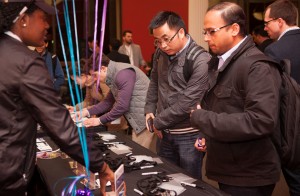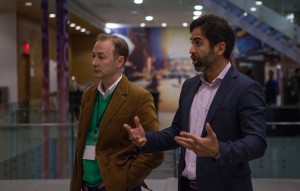Nishit Bhuva is a graduate student pursuing his MBA at NYU Stern. He currently works at the Center for Infection and Immunity as a research scientist with focus on viral infectious diseases. His work experience ranges from intellectual property and licensing in healthcare at Johns Hopkins Technology Ventures to partnership management in scientific information solutions at Elsevier. Nishit holds a B.S. in Biotechnology from University of Mumbai, and a M.S. in Biotechnology Enterprise from Johns Hopkins University.
As a business student at NYU, I feel entrepreneurship is deeply embedded in the student community, thanks to the Entrepreneurial Institute for organizing novel and engaging events like the Healthcare Innovation Makerthon.
Even as "hackathons" are becoming more commonplace at NYU, personally, I am more tuned towards entrepreneurial events that span over a few months, giving ample time to develop an idea. Being the first of its kind, I wasn’t entirely sure what to expect from the Makerthon. I wondered whether it is truly feasible to understand and analyze a healthcare problem and hatch a potential solution in less than 48 hours. But I decided to give it a shot.
I participated in the challenge completely blinded about the format, expectations from participants, and even the problems that we were supposed to solve. Although this feels daunting at first, the excitement of the unknown kept me motivated throughout. With a background in healthcare, the experience of engaging with leaders like Pfizer and Stryker was highly rewarding for me. After the problems were presented on the first evening of the Makerthon, I had a great time networking with the Pfizer representatives who were equally enthusiastic. Although all problems were interesting, I picked the Pfizer track primarily due to the vast number of potential solutions and incomparable access to their knowledge base.
On day 2, the stage was set and we were provided with all necessary tools and resources to bring our ideas to life. I was amazed to see the depth of personal interaction that we had with the industry and domain experts that Pfizer brought to the event. To name a few, the team had expertise in – global commercialization, world innovation, pharmacology, marketing, and R&D. To see Pfizer deeply involved in the Makerthon, it was reason enough to know that the outcome would be worth it.
Following talks by the experts, we had the opportunity to engage in an ideation session with them, where I believe the true magic happened. With the help of frameworks and knowledge sharing, we were able to direct our thoughts and ideas in a meaningful way. Not to mention, all experts were constantly providing feedback to our raw ideas. Honestly, I was humbled by the support and encouragement that the Pfizer team provided – they were highly receptive to new ideas and were keen listeners.
Selecting the team members was a very dynamic process for me. The participants represented such a wide variety of fields that it was difficult to shortlist a few. Given the limited time available, participants with a viable idea briefly presented to all involved in the Pfizer track. This helped in gauging the expertise distribution and inclination of participants. My team members demonstrated interest in my idea and I needed someone with their skills resulting in a good fit. It’s quite fascinating to imagine that the team we formed just 24 hours ago bonded strong enough to create the winning solution – combINR. This was accurately captured by the Pfizer team where their initial skepticism for the event turned out to be surprisingly outstanding. They were impressed at how quickly everyone understood the problem and proposed creative ideas in a short duration.
Winning the first-ever Healthcare Innovation Makerthon was a proud feeling. It strengthened my belief that innovation does not require several years of planning - it’s an agile process that only gets better with each step given the right resources and guidance. I was impressed to see how well the event was structured and executed right from Phase 1 up until now. This gave me a clear and concrete plan of how to proceed and make the most of the opportunities presented at each stage. Throughout the Makerthon, the level of excitement, dedication, and commitment that I observed in all stakeholders – Pfizer, NYU organizing team, and fellow participants – was truly contagious. Now I feel that my unstructured enthusiasm for entrepreneurship is channeled in the right direction.
My combINR team is excited about Phase 3 of this challenge. We strongly believe that with the support from the NYU Entrepreneurial Institute and Pfizer, we can confidently move ahead to making this idea a success.
Stay tuned for more posts on the first-ever Healthcare Innovation Makerthon. Sign up for our newsletters to stay updated on NYU startups and entrepreneurial events that happen all year round.









